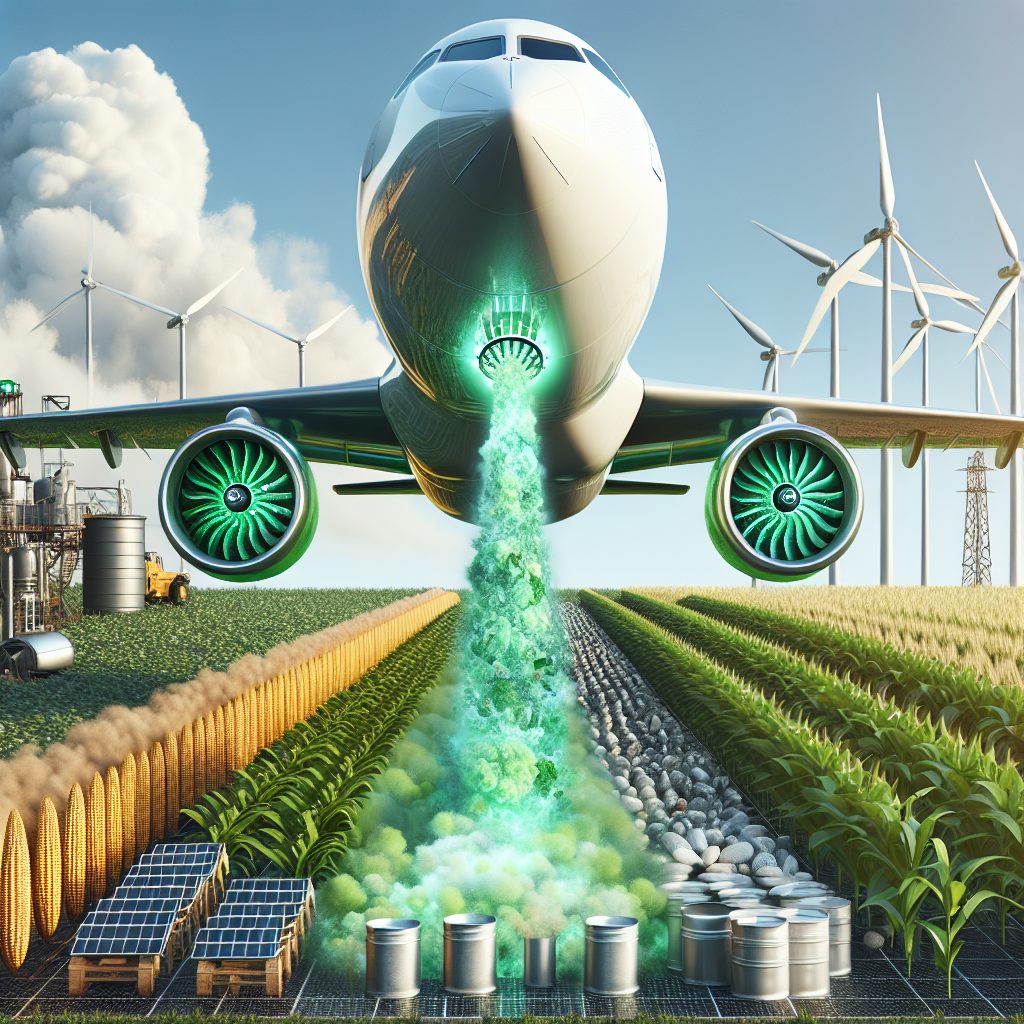
Sustainable aviation fuels (SAFs) are a special type of biofuel made with organic plant and animal sourced materials, such as waste cooking oils or algae, and are produced with sustainability and environmental protection in mind. SAFs are a promising new fuel which can reduce greenhouse gas emissions by up to 80% when compared to traditional jet fuel. They are also significantly easier to store and handle than conventional jet fuels. Airlines are increasingly implementing SAFs into their fleets as part of a commitment to reduce their environmental footprint, and are introducing programs to support their use.
In the coming sections, we will look at the different types of SAFs, their environmental impacts, and the current industry initiatives which are driving their implementation. We will also explore the benefits of this fuel in the aviation industry, and the potential areas of improvement which still need addressing. Lastly, we will discuss the current policies and initiatives which are in place to support the development and use of this resource.
Key Takeaways
1. Sustainable aviation fuels are a type of alternative fuel made from renewable sources which can contribute to reducing carbon emissions in the aviation industry.
2. Conversion rates to sustainable aviation fueling technology vary by region, country, and airport due to obstacles such as capital-investment constraints, economic status, land availability, fuel availability, and policy support.
3. Some common examples of sustainable aviation fuels are: bio-kerosene, bio-gasoline, hydroprocessed esters and fatty acids, and Fischer-Tropsch derived synthetic kerosene/gasoline.
4. Technologies such as emissions-trading schemes, renewable energy, advanced fuels, and alternative power support sustainability efforts.
5. It is important to ensure that sustainably developed fuel resources are used to reduce emissions and not for large-scale energy production.
What Are Sustainable Aviation Fuels?
Sustainable Aviation Fuel (SAF), also known as alternative or non-petroleum based fuels, are renewable fuels that can be used to power commercial aircraft. They are specifically designed to reduce greenhouse gas emissions, including those originating from the aviation sector. SAFs can be produced from a variety of feedstocks, including oil-based feedstocks such as “biofuels” and synthetic fuels, and non-oil-based feedstocks such as biomass, algae, and waste. SAFs offer the potential to reduce aviation-related emissions compared to conventional petroleum-based aviation fuel.
Benefits of Sustainable Aviation Fuels
SAFs provide a number of benefits, including reducing greenhouse gas emissions and environmental pollution from aircraft. By utilizing SAFs, airlines can help reduce global climate change while still providing safe, reliable air transportation. Additionally, SAFs can help reduce the air pollution associated with aircraft operation, which can be harmful to human health.
Using SAFs can also help reduce aviation fuel related costs. As SAFs are renewable and carbon-neutral, they typically cost less than traditional petroleum-based jet fuels. This can help airlines save money, both in the short-term and long-term, by reducing air pollution and related health costs. In addition, reduced emissions associated with SAF utilization can help reduce airline operational costs associated with adhering to new carbon offset regulations.
Challenges of Sustainable Aviation Fuels
SAFs are not without their challenges. Because of their high costs, SAFs are not yet widely available and can be difficult to access or transport. Additionally, the manufacturing and certification process for SAFs can be quite complex, and there is still a lack of consistent standards and regulations for producing, storing, and using them.
Optimizing Sustainable Aviation Fuel Use
To help airlines make the most of SAFs, there are a number of strategies and practices they can implement. Airlines should develop a comprehensive fuel plan, identify and assess fuel options, develop fuel-use policies and procedures, and work with suppliers and regulator to ensure safe and reliable alternative fuel use.
Additionally, airlines should consider utilizing fuel management systems to track fuel-use trends and make informed decisions about fuel usage and emissions. In addition, they should create fuel conservation initiatives to reduce fuel costs, as well as programs to increase employee and customer awareness and education of alternative fuel sources.
Tips for Optimizing Sustainable Aviation Fuel Usage
1. Develop a comprehensive plan for fuel usage, including identifying and assessing fuel options and developing fuel-use policies and procedures.
2. Utilize fuel management systems to track fuel use trends and make informed decisions about fuel usage and emissions.
3. Create fuel conservation initiatives to reduce fuel costs, as well as programs to increase employee and customer awareness and education of alternative fuel sources.
4. Work with suppliers and regulatory bodies to ensure safe and reliable alternative fuel use.
5. Consider investing in alternative aviation fuel infrastructure, such as fuel storage and distribution facilities, and pathways to increase access to SAFs.
What are Sustainable Aviation Fuels?
Sustainable Aviation Fuels (SAF) are low-carbon alternative fuel for powering aircraft. They are designed to reduce up to 80% of greenhouse gas (GHG) emissions compared to conventional jet fuel. SAFs can be derived from a variety of renewable sources, including biofuels and synthetic fuels made using renewable electricity and carbon capture and sequestration in combination with recycled carbon dioxide from industrial sources.
What are the Benefits of Sustainable Aviation Fuels?
The major benefit of a SAF is the decrease in GHG emissions compared to conventional jet fuel. SAFs also reduce noise pollution and require fewer hazardous chemicals during production, leading to a smaller environmental footprint. Additionally, they do not compromise the performance of the aircraft and are less expensive than fossil fuel.
What Types of Sustainable Aviation Fuels Are Available?
There are several types of SAFs available, including biofuels derived from plant oils and animal fats, synthetic fuels, and fuel made from recycled carbon dioxide. Each type is used differently and depend on what kind of renewables or other resources are most available in the area.
How Are Sustainable Aviation Fuel Produced?
SAFs are produced in several stages, depending on the type. For biofuel, the common feedstocks are vegetable oils and animal fats, which are converted to alcohols and then undergo hydro-processing to become biojet fuel. Synthetic fuels are produced using renewable electricity and captured carbon dioxide from industrial sources, and are also then hydro-processed.
How Do Sustainable Aviation Fuel Impact Performance?
SAFs have been tested extensively and have been found to provide the same power output and engine performance as traditional jet fuel. The fuels also require no additional modifications to be used in their intended applications.
What are the Current Challenges with Sustainable Aviation Fuels?
Currently, the cost of production is one of the major challenges facing SAFs. The cost of production has decreased significantly over the last decade, but is still higher than that of conventional jet fuel. Additionally, the availability and distribution of SAFs is still limited in certain areas.
Are Sustainable Aviation Fuels Cost-Effective?
The cost of production for SAFs is currently higher than that of traditional jet fuel, but their use still result in overall cost savings in comparison to conventional fuel over the long term. The cost savings are due to the lower emissions and environmental impact of SAFs, as well as their lack of dependence on volatile fossil fuel prices.
Are Sustainable Aviation Fuels Gaining Popularity?
Yes! More and more airlines are beginning to adopt SAFs in their operations as the cost of production decreases and the environmental benefits become more widely recognized. The majority of SAFs used today are biofuels, but synthetic fuels are slowly becoming more available and popular.
How Can I Support the Use of Sustainable Aviation Fuels?
One of the best ways to help support sustainable aviation fuels is to become an advocate and spread awareness of their environmental benefits. Additionally, you can look into purchasing SAFs from your local airports or airlines, if available.
Do Governments Subsidize Sustainable Aviation Fuels?
Yes, several governments around the world are now offering subsidies or other incentives for the use of sustainable aviation fuels. The incentives are designed to reduce the cost of production and encourage the development of new alternative fuel technologies.
What is the Outlook on Sustainable Aviation Fuels?
The outlook for SAFs is very promising. It is estimated that alternative jet fuel use will increase significantly over the next decade as improvements in production costs and availability continue to be made. Additionally, as governments provide further policies that encourage the use of SAFs, their use is likely to increase dramatically.
Are Sustainable Aviation Fuels Safe?
SAFs are produced to rigorous standards of quality control and are subject to third-party audits. Additionally, they are tested in many simulative and real-world environments to ensure they meet safety standards. This makes them as safe to use as traditional jet fuels.
Final Thoughts
Sustainable Aviation Fuels (SAFs) are becoming an increasingly popular solution to reduce emissions and other environmental impacts of air travel. Their use has many benefits, including lower GHG emissions and reduced noise pollution. They also don’t require modifications to current aircraft, and do not require additional hazardous chemicals for production. With the cost of production decreasing, more and more airlines are incorporating SAFs into their operations. Governments around the world are offering incentives and subsidies to reduce the cost of production and encourage the use of alternative jet fuels. The outlook for SAFs is optimistic, and their use is likely to increase in the coming decade.



